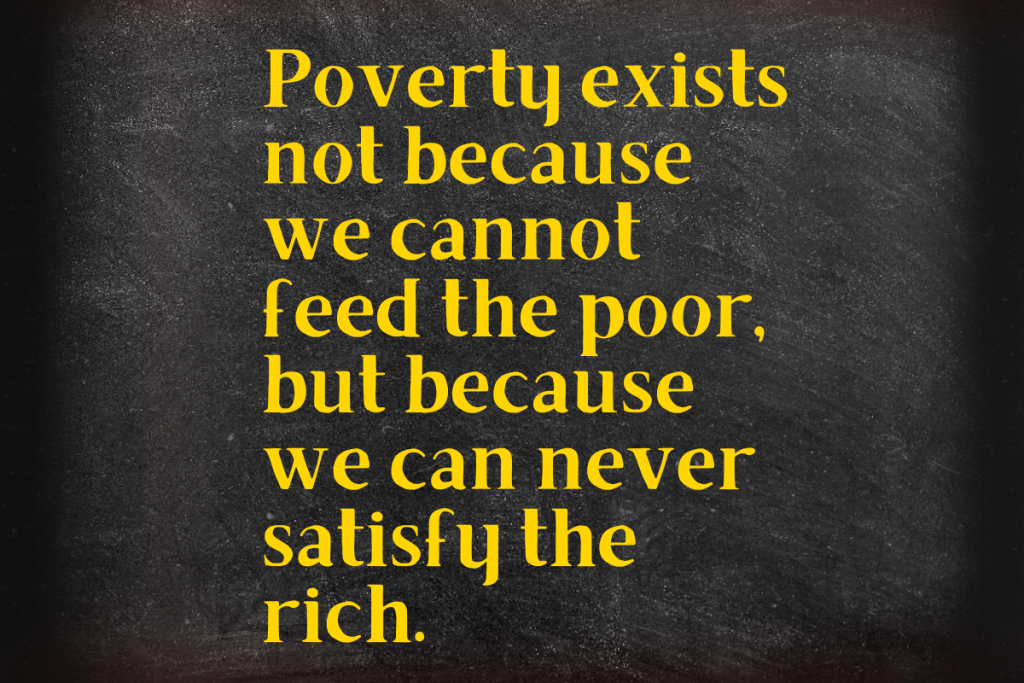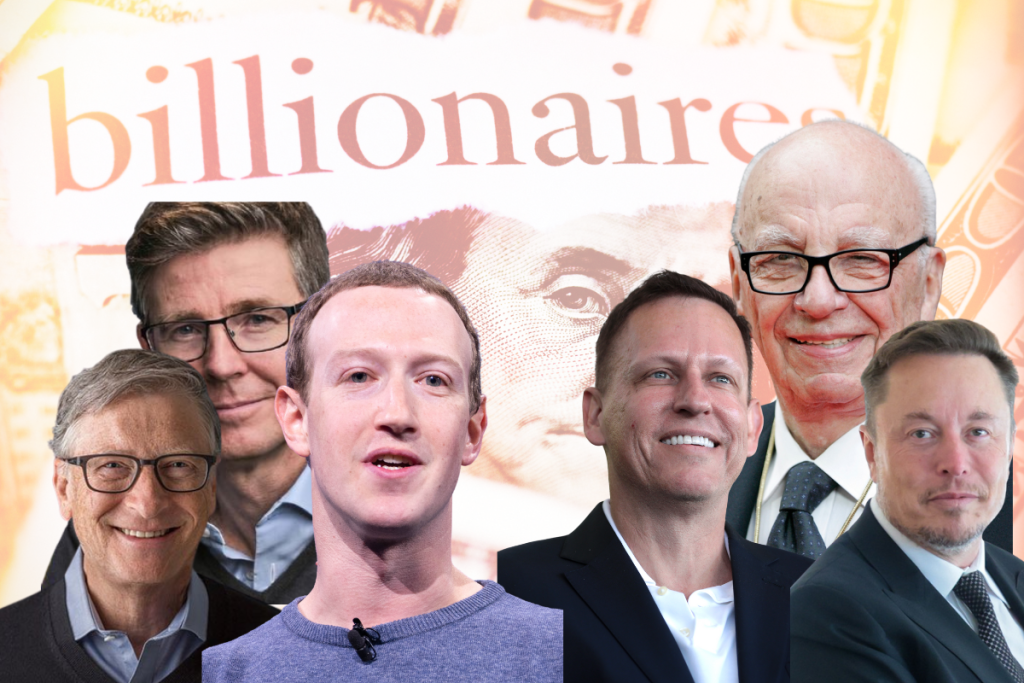After a recent interview with Diana Sarosi from Oxfam Canada about the growing disparity in global wealth I was reminded of a TED Talk by Nick Hanauer titled “Beware, Fellow Plutocrats, the Pitchforks are Coming.” His message, about the widening chasm between the haves and the have-nots, has lived rent-free in my head since I first watched it in 2014. In the decade since, Hanauer’s foresight into economic disparities have only become more relevant as these gaps have widened, making his warnings feel almost prophetic.
While there are a few notable exceptions among the ultra-wealthy who have used their fortunes for societal good, the general trend among billionaires does not inspire confidence. They often position themselves as saviours of society while their substantial resources could have bridged the equity gap much faster and more effectively than any charity gala or public pledge.
Can We Talk About Warren Buffett?
I recently had the audacity to speak unfavourably of Warren Buffet on social media, and the replies, primarily from finance bros, were telling and a little disturbing. From being told I didn’t understand economics to someone telling me to pick someone else to go after because Buffett “literally created the giving pledge”, provided a stark reminder of just how much billionaire’s money has twisted our perspective.

Warren Buffett has been heralded repeatedly for starting The Giving Pledge, urging billionaires to give half their wealth to philanthropy. Yet, decades into this pledge, critical global issues like poverty, health inequity, and climate change continue to escalate. This man is 93 years old. It would be virtually impossible for him to spend his wealth in the time he has left on earth so why is he waiting until he’s dead for his wealth to be distributed? Why wouldn’t you want to see how much good you could do with the time you have left? The truth is, if billionaires really wanted the world to be a better place, it already would be.
Do Ethical Billionaires Exist?
Is it possible for billionaires to be ethical? The short answer is no. No one becomes a billionaire through their efforts alone. Instead, this wealth is usually built on the back of our collective labour, often involving various levels of exploitation. Our economic systems are designed to reward those at the top disproportionately, far beyond their individual contribution.

Exploitation here isn’t just about direct wrongdoing. It’s a spectrum that moves from being blissfully ignorant to actively manipulating systems to safeguard or increase their fortunes, often at our expense. The reality is that the staggering levels of wealth that billionaires amass necessitate practices like maintaining low wages, evading taxes through intricate global schemes, and prioritizing corporate profits over the well-being of communities and the environment. It’s tough to see how you can rack up that kind of wealth without being tangled in systems that inherently make the rich richer and the poor, well poorer.
Eat the Rich? Nah, Tax Them
When we place billionaires on golden pedestals, it does us more harm than good. Their massive fortunes come at the expense of the social structures that support the majority. Consider the sectors billionaires frequently target for disruption: healthcare, education, and even essential public services. Yes, I’m looking squarely at you Galen Weston. Billionaire investments prioritize profit over public good, undermining the foundations of equitable society.
I’ll concede that I’m not an expert in economics but if the current system can justify such severe disparities where billions live in poverty while a few accumulate wealth that could sustain generations, then perhaps it’s the economic system that’s flawed, not the critique of it. The notion that one can simply “pull themselves up by their bootstraps” is outdated and unrealistic. Numerous experiments with universal basic income have shown significant improvements in quality of life, debunking the myth, sold to us by billionaires, that people must always earn their way out of hardship.

Instead, a large majority of us continue to buy into the narrative that if you just work hard enough you too can become a member of the billionaire’s club. Except that’s not true. Every single billionaire has a public relations story meant to distract you from the realities of how their wealth was actually accumulated. Donald Trump received a “small” loan from his Dad, Elon Musk used his smarts not his father’s money from an emerald mine, and even the beloved Buffett had help from his politician/businessman father. We are told it’s a meritocracy, when in fact we exist in a plutocracy.
Enjoying this post? If it made you think, smile, or yell “Yes!” at your screen, consider buying me a coffee. It helps fuel the stories and conversations you find here.

But What About the “Good” Billionaires?
Currently, and perhaps somewhat biased since I share women’s stories on my radio show and podcast, it appears women billionaires are setting themselves apart by using their wealth for societal good. Taylor Swift has made numerous charitable donations, supporting causes from disaster relief to education. MacKenzie Scott (ex-wife of Jeff Bezos) has donated billions, impacting hundreds of charities across various sectors. Melinda French Gates (ex-wife to Bill Gates) has focused on global health and equality, while Dr. Ruth Gottesman made medical education accessible at a Bronx medical school. Despite these commendable acts, it begs the question: why must society rely on the benevolence of the wealthy, whose fortunes were amassed through societal means?

Side bar; I’m a devoted Swiftie. That does not mean that I can’t still be critical of billionaires being problematic. Two things can be true at the same time, and a lot of us have forgotten that.
Wealthy Men Making Questionable Decisions
The last couple of years have provided numerous examples of why we can’t just hope billionaires will do the right thing. The billionaire space race is a glaring example of their misplaced priorities. Jeff Bezos and Elon Musk have dumped billions into space exploration while people are starving and dying from curable diseases here on Earth. Many of those fighting hunger, by the way, are Amazon employees. Musk’s pledge of $6 billion to combat world hunger, which ended up in his own foundation, reeks of insincerity and makes you question the real impact of such grand gestures.

Musk’s actions, in particular, extend beyond questionable financial commitments; his influence over social media platforms has real-world consequences. Reports have implicated his involvement in stirring political unrest in the UK, leading to calls for his accountability. This kind of power misuse by billionaires highlights the dangerous implications of their unchecked influence.

And let’s not forget the recent totally avoidable disaster with a submersible mission funded by the wealthy. These vanity projects, prioritizing personal glory over genuine societal benefit, show just how detached these billionaires are from the harsh realities many face. Bottom line, it’s time we stop letting their whims dictate the welfare of our planet and its people.
The Damage Billionaires Cause
In our society, we see a version of socialism for the rich and rugged capitalism for the poor. Major corporations, teetering on the brink of failure, often receive bailouts funded by taxpayer dollars, yet the profits they subsequently make are privatized. This stark contrast underscores a system where the wealthy are cushioned against financial peril while the general populace bears the risk. The current global divide is significantly financed by the rich, who, like Elon Musk’s controversial management of Twitter, wield their power to drive societal wedges. Similarly, AI companies are rapidly advancing technologies that blur the lines between reality and simulation, creating images, videos, and narratives so convincing they challenge our grasp of truth. This unchecked growth fosters division, distracting from the systemic income theft and labour exploitation perpetrated by those at the top.

Reframing Our Relationship with Wealth and Billionaires
While I think expressions like “eat the rich” and “the pitchforks are coming” are good at conveying our level of frustration and anger at the current system, neither are the answer. To change how we view and discuss billionaires, we first need to recalibrate our understanding of wealth and its implications:
- Recognize Their Humanity: Billionaires have the same 24 hours in a day as the rest of us. Their immense wealth isn’t a result of superhuman effort or intellect; it’s often built on the backs of others through systemic exploitation. Remembering this helps demystify their status.
- See Beyond Divisive Tactics: The narrative that pits you against your neighbour is a distraction orchestrated to keep the status quo. Recognizing that your neighbour isn’t your enemy but rather another ally in the struggle against economic inequality is crucial.
- Grasp the Scale of Wealth: Understanding the real difference between a million and a billion is vital. A million seconds is about 11 days, while a billion seconds is almost 32 years. This staggering difference puts into perspective just how much wealth billionaires control.
- Comprehend Limited Wealth Distribution: Imagine if all the wealth in the world were $100. The top 1% would control $50, the next 9% would have $35, and the following 20% would hold $12, leaving just $3 for the remaining 70% to share. This over-simplification highlights the extreme concentration of wealth and the tiny fraction left for the vast majority. Spoiler: chances are good you’re part of the 70% fighting for a piece of that $3 slice of pie. Now tell me again what you’re fighting with your neighbour about while the rich rob you blind?
- Value Collective Power: Never underestimate the strength of collective action. Labour unions and collective bargaining have historically been powerful tools for securing fair treatment. Beware of any government or business that actively seeks to break up labour unions or prevent them from forming. Whether you belong to one or not, unions represent you. The audacity to call teachers and nurses greedy for demanding better wages would be funny if it wasn’t so damn heartbreaking. Think about the narrative we see in the papers and government when unions seek higher wages (Oh hey Doug Ford), but then not a peep when businessmen take yet another record-breaking bonus.
- Stay Informed and Engaged: Indifference or resignation only worsens societal issues. By staying informed and actively participating in discussions and movements, you contribute to the potential for change. Your vote is a key tool in shaping the policies that govern economic disparities. Use it.
- Support Ethical Businesses: Look for businesses that prioritize providing valuable services and sustaining their employees over “scaling and whaling” everything to maximize profits. Supporting these businesses helps foster a healthier economic environment where wealth is more equitably distributed.
- The System is Rigged. Stop beating yourself up. You’re a good person working in a system never made for you.
By reshaping how we look at and discuss wealth, hopefully we can begin to dismantle the structures that allow billionaires to flourish at the expense of the wider society. We need to do this work now before the world turns out it’s first trillionaire and there’s even less for the rest of us to survive on.